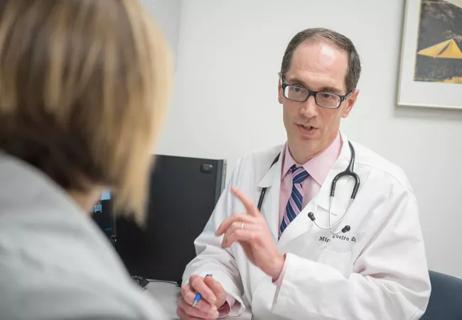The unique program addresses an unmet need and continues to expand

Cleveland Clinic’s unique inflammatory bowel disease (IBD) fellowship program for advanced practice providers (APPs) will soon enter its fourth year, with further expansion on the horizon.
Advertisement
Cleveland Clinic is a non-profit academic medical center. Advertising on our site helps support our mission. We do not endorse non-Cleveland Clinic products or services. Policy
The first of its kind in the country, the IBD APP program was modeled after advanced IBD fellowships for gastroenterologists. These programs feature subspecialty “entrustable professional activities (EPAs),” or competency marks, that providers should be able to perform unsupervised in a clinical setting.
The program addresses an unmet need, says program co-director Jessica Crimaldi, CNP, IBD, since APPs — primarily nurse practitioners and physician assistants — typically train in primary care but then often work in subspecialties.
“In those cases, the training is usually on the job,” Crimaldi says. “It’s a huge burden on a hiring manager to train a new APP who doesn’t have any subspecialty training. Because APPs are working so much in GI and specifically in IBD, we felt this program would be helpful to bridge that gap in knowledge that you really don’t get in school.”
This new training approach is particularly important now, due to the dramatically shifting scope of IBD care, says program co-director and medical lead Benjamin Cohen, MD.
“The complexity of IBD care is increasing rapidly,” says Dr. Cohen. “We have many new drugs that have been approved in the last few years, so even community practice gastroenterologists have difficulty keeping up to date with evolving IBD care. Plus, if you have an APP who joins the practice, there may not be the mentorship opportunities there that they need to specifically learn IBD.”
Because the training qualifies APPs for autonomous practice, they can potentially fill a workforce need. “The program provides us the opportunity to help train high-quality APPs to go out and do IBD care in the community,” explains Dr. Cohen. “There’s a big focus on trying to get IBD patients to expert centers, but the reality is the expert centers can’t care for all the IBD patients. There are too many, and people are located in places where they may not have easy access. So, it’s really important to have fellowships or other educational programs specifically for APPs to serve those communities.”
Advertisement
Crimaldi points out that the IBD fellowship adds to Cleveland Clinic’s portfolio of APP fellowships going back about a decade, including similar programs in dermatology and emergency medicine with more planned for the future. “At Cleveland Clinic there’s a big focus on training and orientation for APPs,” she notes.
Dr. Cohen agrees, “Because of that precedent, it seemed natural to extend this to IBD because we are one of the international leaders in IBD education.”
The program’s third fellow began her year in October 2024. The first quarter of the training focuses on general gastroenterology, followed by IBD-specific content for the rest of the year. About a third of the fellow’s time is dedicated to working on a quality or research project, with Dr. Cohen, Crimaldi and other mentors.
The content, derived from the EPAs, includes both outpatient and inpatient direct care of patients with IBD, exposure to IBD endoscopy and surgery, and care of the patient with ileal pouch-anal anastomosis. Other aspects include transitions of care, clinical trials and attendance at national IBD conferences.
The fellow participates as part of Cleveland Clinic’s multidisciplinary IBD team, which also includes specialists from rheumatology, dermatology, pathology, radiology, surgery, psychosocial care and nutrition. This is important because patients with IBD also commonly have other chronic medical conditions, Dr. Cohen says.
“At Cleveland Clinic we have an IBD medical home. We explain to patients that we have team-based care. It’s really about approaching their disease from multiple angles to improve their outcomes.”
Advertisement
The success and demand for the IBD APP Fellowship has shown that this will be a program we continue for years to come. “The first few years have been very successful. Now, we’re looking at different models for how to include more people, whether it’s the one-year fellowships or doing shorter fellowships or preceptorships and having more fellows working in the community,” Dr. Cohen says.
Building on this concept Jessica Crimaldi and Dr. Cohen launched Cleveland Clinic’s IBD APP Immersion Program in 2024 through sponsorship by Johnson & Johnson Innovative Medicine. As part of this program, five APPs from across the country are spending two weeks at Cleveland Clinic for intensive IBD didactics and clinical exposures to enhance their IBD care. In 2025, the Immersion Program will expand to include PharmDs under the leadership of Dr. Shubha Bhat.
By offering different models for IBD APP training, Dr. Cohen and Crimaldi hope that Cleveland Clinic can help decrease the IBD APP education gap and meet the differing needs of many APPs in the community. An entire year may not be necessary, depending on the APP’s goals. “Some might want to become an expert clinician and primarily take care of patients, while others might want to learn about research and develop a more academic career, which is something we can offer as well. The nice thing about a program like this is that we can really tailor them to the needs of the learners we’re training,” Dr. Cohen observes.
Advertisement
Advertisement

Insights from Dr. de Buck on his background, colorectal surgery and the future of IBD care

Findings help close the knowledge gap around VTE practice patterns

The Integrated Program aligns IBD care and research across Cleveland Clinic locations

Diet has a profound impact on how the intestine functions

Patients, caregivers and healthcare partners explore challenges during key transition points in care

Reassuring results, but patient education is still important

Insights on guiding treatment decisions

Underlying inflammation may cause higher rates of CV events